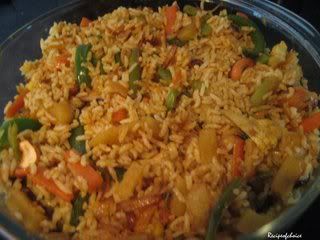
The name biryani or biriani (Nastaliq بریانی ;Devanagari बिरयानी) is derived. Hyderabadi biryani is savoured in all parts of India and forms an integral part of Indian cuisine. Historians claim that the earlier Nawabs of Punjab wore a matching turban for each variety of biryani. The Nizam's kitchen boasted of 49 kinds, which included biryani made from fish, quail, shrimp, deer and hare. The Sindhi variant of biryani is very popular in Pakistani cuisine and biryani of all types are eaten in all parts of Pakistan. Another popular form of biryani is the Awadhi biryani.
In Pakistan and North India, biryani enjoys substantial popularity. This is especially the case in Karachi, where the chicken version is popular with both young and old alike as a dish of choice. This is related to Awadh biryani but combines elements of Bombay biryani and includes potatoes.
Tehari is the name given to the vegetarian version of the dish and is very popular in Indian homes. In Bangladesh, Tehari refers to Biryani prepared by adding the meat to the rice, as opposed to traditional Biryani where the rice is added to the meat.
The vegetarian version might have some Textured vegetable protein based protein balls to present the impression of a meat-based dish for vegetarians. The difference between biryani and pullao is that while pulao may be made by cooking the items together, biryani, is used to denote a dish where the rice is cooked separately from the other ingredients.
In Bangladesh it has attained the status of an integral part of any ceremonial meal or public feast. Weddings in Dhaka usually end up with serving of this popular dish. Bangladeshi biryani, is the most well known form of biryani in countries outside Asia, (especially in Great Britain).
In Myanmar, biryani, known in Burmese as danpauk, is popular among the populace. In Yangon, there are several restaurant chains that serve biryani exclusively. It is often served at religious ceremonies and luncheons. Biryani in Myanmar utilises a special species of rice grown domestically rather than basmati.
In Thailand, Thai Muslims have popularized a local variety of the dish which is popular through out the country. Along with Thai Curry Mussuman it is one of the two most famous Muslim Thai dishes.
0 件のコメント:
コメントを投稿